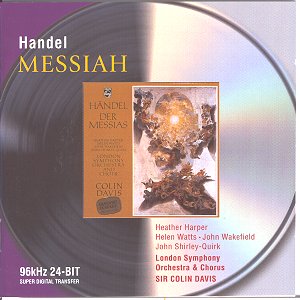George Frederic HANDEL
Messiah - Oratorio in three parts, complete
 Heather Harper (sop)
Heather Harper (sop)
Helen Watts (alto)
John Wakefield (ten)
John Shirley-Quirk (bass)
London Symphony Chorus
(John Alldis, chorus master)
London Symphony Orchestra/Sir Colin Davis
 Philips 50 Great Recordings
464 703-2, 2CDs [144.03]
Philips 50 Great Recordings
464 703-2, 2CDs [144.03]
Crotchet
AmazonUK AmazonUS

This recording was first issued in 1966 and its last appearance was as a
Philips Duo. It is attractively presented in a slim format double jewel case;
it comes complete with interesting notes by Bernard Jacobson and with a libretto.
Unfortunately the notes and libretto are badly printed on cheap paper.
When it first appeared in 1966 this version was hailed as the first of a
new generation of more authentic recordings. A few weeks later came a recording
by Sir Charles Mackerras which used a chamber orchestra and small chorus
and used a new 'authentic' version by Basil Lam. At that time I preferred
the Mackerras version and now, 35 years later, after we have all become much
more used to authentic instrumentation and a more historic approach to this
glorious music, my original preference has, if anything, been strengthened.
Perhaps it is more accurate to think of the Davis version as being the last
of the older approach rather than the first of a new order. The problem lies
not only with the large orchestra (even though the LSO was then at its peak)
and correspondingly big choir, but rather with a rhythmically inflexible
and heavy interpretation. Sir Thomas Beecham has demonstrated that you do
not have to obsessed with authenticity to get the best out of Handel's music
- flexibility of rhythm and phrasing is all important.
However the set has very strong virtues and these lie with the singing, both
of the choir and of the soloists. The London Symphony Chorus under the direction
of John Alldis makes a strong contribution in scale with that of the orchestra.
The chorus 'For unto us' is particularly well done; 'Hallelujah' sounds well
in the traditional manner but suffers towards the end from over-exuberant
percussion. Heather Harper, Helen Watts and John Shirley-Quirk were all at
the height of their powers at this period and John Wakefield also fits in
well. There is no doubt that the glories of the solo singing are a major
attraction of this issue.
The recording is very clear in this 24 Bit digital transfer, only the slightest
hint of fizz at climaxes betrays the age of the original analogue recording,
and again the sound of the soloists is particularly impressive.
Arthur Baker

